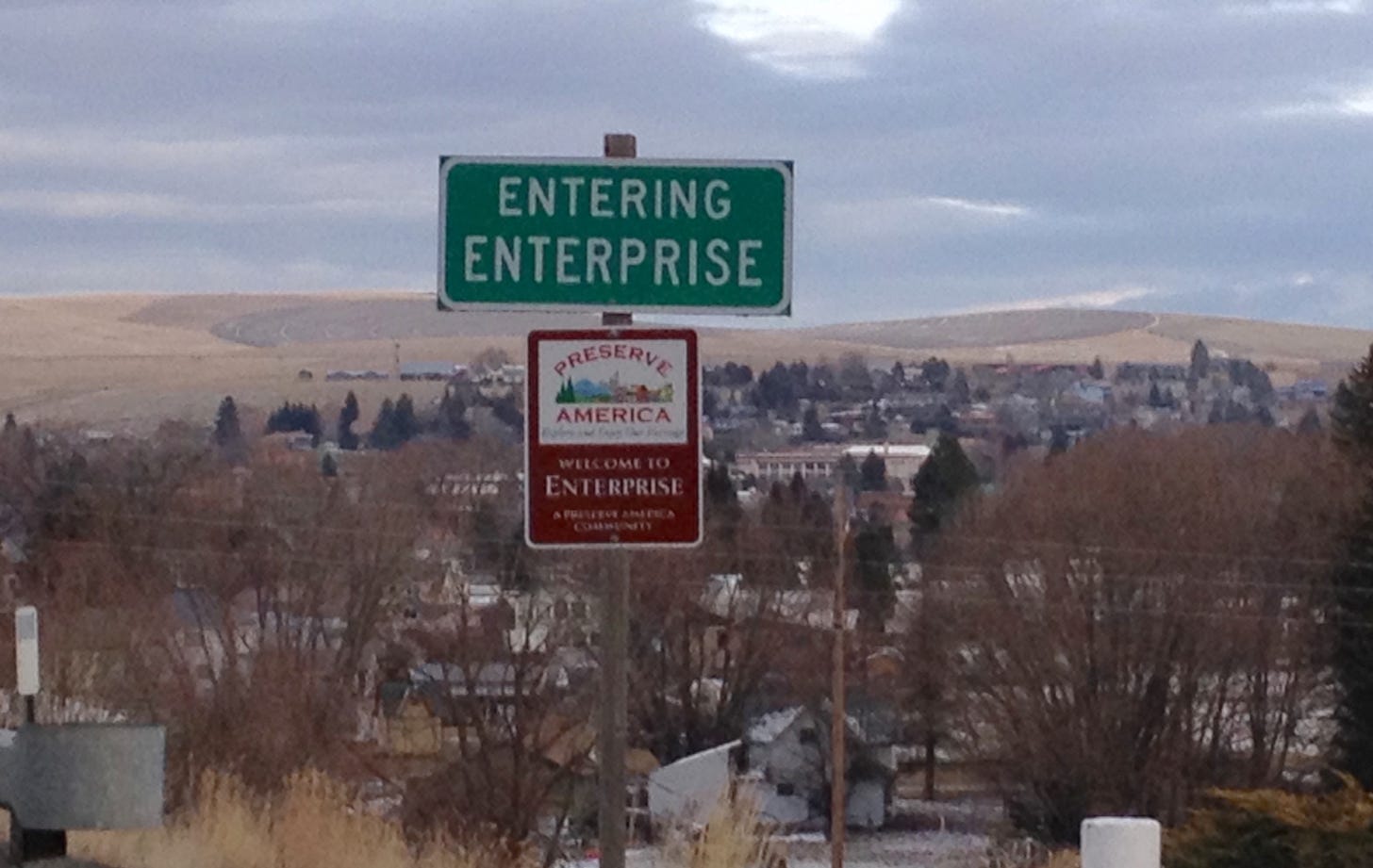The End of the Road
I came to Oregon and the Wallowa in 1971, when Vietnam was still raging and the cities were in turmoil. I remind my fellow citizens that we’re all, one way and another, end-of-the-roaders.
Rich directs the Library at the Josephy Center for Arts and Culture in Joseph, OR, and writes a column for the Wallowa County Chieftain.
Oregon was the end of the Trail, and in 1843 wasn’t even a U.S. Territory; it was “jointly occupied” by the British and the Americans — fictionally — while in fact occupied by hundreds of bands and tribes of Indians. It was stolen ground. The Trail bypassed the Wallowa, which wasn’t seriously entered by whites until 1871, long after joint occupancy was resolved and Oregon was a state.
Years ago, when one political upheaval or another was moving Oregon Republicans to the right and Democrats to the left, it occurred to me that what unites Oregonians is our unrelenting individualism — with a passion too for community. Communitarian Republicans such as Tom McCall and Mark Hatfield were fading fast in a sea of far right and religious candidates. Democrats were stumbling over personal shenanigans, but generally have stayed a firmer middle, McCall-like, course.
Forty years ago in Wallowa County the barroom walls had words and images pitting the hippies vs. the cowboys, the dopers vs the goat-ropers, and, in the timber wars of the ‘80s, it was a fundraising basketball game between artists and loggers, with logger cheerleaders dumping stuffed spotted owls into trash cans.
Jack Finch taught me about the end of the road in the early ‘80s. I had a bookstore in Enterprise then — frequented by goat ropers and dopers. Jack was a daily presence in the little coffee shop we had at the rear. He was born and raised in Eastern Washington in the Depression years, “one of three in town with a job in 1935, and my job was administering the dole.” Jack made it through college, came back to be a principal on the Nez Perce Reservation in Idaho, then migrated to Alaska where he was the head of vocational education. There was a timeout to advise Arkansas Republican Gov. Winthrop Rockefeller as he integrated schools and prisons. Finch and his wife ended up in semiretirement in the two-room school in Imnaha, Ore.
The loggers, hippies, and goat-ropers in Imnaha never had it so good. Jack took students to plays in Spokane every year, and at least once took a group East to Broadway. Parents of all political and religious persuasions got along with him. He thought it was his experience in Alaska that had prepared him for the Imnaha job. Both are end-of-the-road places, he said, where people come to hide their pasts and make new beginnings, or just to hide.
Vietnam vets came to Imnaha to get away from their war — or the drugs that were grabbing them in the cities. Retired military officers became ranchers. An old Hollywood movie icon, Eugene Paillette, one of the silent movie’s “Three Musketeers,” paved the way for rugged and rabid individualists, building a survivalist ranch in the 1940s; the Asians and the communists would have to make it through two canyons that he could blast shut to reach his Imnaha River hideout.
For 45 years, from bookstore days to tenures in the non-profit world, two terms on a school board, and 35 years of newspaper columns, I’ve held a mostly liberal line. But I've made fun of my own kind often enough, and tried to be honest with the people I meet and the ideas I promote to have made friends who mostly vote the other way. “Mushy hearted” conservative Wallowa Countians have stepped up to promote school bonds, form an arts council, and host Vietnamese and Laotian refugees when that was the need.
We seem to be able to coexist in our end-of-the-road county in the end of the road state. It’s our history. Friend and writer Greg Nokes has made a post-retirement living pointing out the crazy quilt of Oregon’s racial past: No Slavery in Oregon, and, by the way, No Negroes in Oregon, according to our original constitution.
Oregonians of the day liked Doc Hay, the Chinese doctor of John Day, but didn’t like the idea of a Chinese community in Eastern Oregon. The Chinese — mostly miners — all left, but Doc Hay lived on and served his Eastern Oregon community until he died in 1948. But if you check the museum and Hay’s original store/apothecary, you’ll be shown the bullet holes in the walls where drunk townsfolk took late-night shots at him. Nokes has a book on the Chinese Massacre in Hells Canyon, perpetrated by outlaws and some schoolboys from Imnaha.
I came to Oregon and the Wallowa in 1971, when Vietnam was still raging and the cities were in turmoil. I’m not always proud of the place, but I’ve made a life here, and remind my fellow citizens that we might have come here for different reasons, that our politics are a jumble and we don’t all go to the same church — or any church, but we’re all, one way and another, end-of-the-roaders.
And we do things to be proud of too; today, in the Wallowa, we are welcoming the Nez Perce home. But that’s another story.





